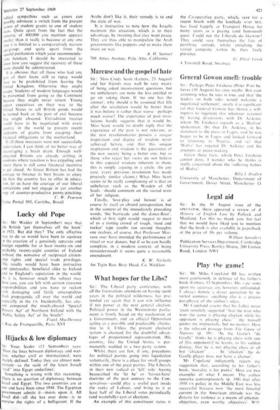Marcuse and the gospel of hate
Sir: Miss Cindy Scott (Letters, 23 August) and her friends may well be very weary of being asked inconvenient questions, but we unbelievers are none the less entitled to go on asking them. If 'no one has the answer', why should it be assumed that life after the revolution would be better than it was before it rather than worse--perhaps much worse? The experience of past revo- lutions hardly suggests that it would be. Miss Scott would no doubt reply that the experience of the past is not relevant, as the new revolutionaries possess a unique inspiration and degree of wisdom never achieved before, and that this unique inspiration and wisdom is the guarantee of the new society being a better one, but as those who reject her views do not believe in this especial wisdom inherent in them, this is simply arguing in a circle. (In any case, every previous revolution has made precisely similar claims.) What Miss Scott seems to be really complaining of is that an unbeliever:-such as the Warden of All Souls—should comment on the sacred texts of her religion.
Finally, 'love-play and heroin' is of course by itself an absurd juxtaposition, but in the context of the immediately preceding words, 'the barricade and the dance-floor', which at first sight would suggest to most of us a rioting crowd of tough, 'mod and rocker' type youths (on second thoughts one realises, of course, that Professor Mar- cuse may have intended the performance of ritual or war dances, but if so he can hardly complain, in a modern context, of being misunderstood) it seems quite a reasonable emendment.
K. W. Nicholls An Tigin Ban, Bray Head, Co. Wicklow






































 Previous page
Previous page